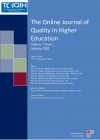TOJQIH - Volume 6 - Issue 2 - April 2019
 DETERMINING EXIT CRITERIA FOR ENGLISH LANGUAGE PROFICIENCY IN PREPARATORY PROGRAMS AT TURKISH UNIVERSITIES
DETERMINING EXIT CRITERIA FOR ENGLISH LANGUAGE PROFICIENCY IN PREPARATORY PROGRAMS AT TURKISH UNIVERSITIES Ayşe Dilek Keser, Gül Durmuşoğlu Köse
Abstract:
This study intended to identify the exit criteria in English Preparatory Programs (EPPs) at universities by hearing stakeholders in a three-phase Delphi study. The participants were teachers and students from the EPPs and faculties of 11 universities in Turkey. In the open-ended Delphi, 472 compositions from four universities describing the exit level skills were analysed and 12 participants were interviewed. In the face-to-face Delphi, 23 panellists from 10 universities attended a two-day brainstorming and focus-group meeting. Using the findings of these two phases, a 213-item Likert-type questionnaire was designed to rate the necessity of each skill (online Delphi) with participants from 11 universities. In the first rating, the respondents (n=40) evaluated where each skill should be taught along with their necessity. In the second rating, the respondents (n=36) focused on skills only in EPPs. The results suggest that the stakeholders have a preference towards teaching academic skills rather than general English.
 ENHANCING STUDENT LEARNING THROUGH ACTION RESEARCH EXPERIMENT WITH THE SELECTED GROUP OF BUSINESS STUDENTS: AN EMPIRICAL STUDY
ENHANCING STUDENT LEARNING THROUGH ACTION RESEARCH EXPERIMENT WITH THE SELECTED GROUP OF BUSINESS STUDENTS: AN EMPIRICAL STUDY Indranil Bose, Yakub Iqbal Mogul
Abstract:
Both the intrinsic and extrinsic values of the teaching are long established as important metrics to measure the effectiveness of teaching practices in higher education across the globe. In this context, the enhancement of pedagogical practice through reflection and research into practice has remained the core to develop tutor’s capability to effectively teach and facilitate learning in present day higher education. Business management higher education is no exception. Here also, the significance of action research as a method of revelation, instruction and improvement and as the realization of technical skills, application of the concepts and facilitation of learning, is hard to over-emphasise. In the present action research project, unit 4.5 on marketing of the ATHE Business level 4 curriculum has been chosen for intervention and experimentation. The unit has been introduced for the first time and is the first unit of marketing, that must be taught to the students. As the students did not have any prior knowledge and understanding on the subject, it was indeed challenging for the tutor to make them understand, learn and to develop a clear concept on the subject by ensuring better learning experience. A total number of sixteen students enrolled with the course was chosen for the entire project. During the initial two sessions, the tutor used traditional lecture method, but that failed to generate much impact on the student and this was visible in the class reactions and responses. The same could have been supported through the MCQ test result and the standard feedback collected through questionnaire. As, case study linked problem based teaching is widely considered as an effective method for better business student learning experience across the globe and the literature also supports the same, the same was attempted in the class. Four different cases on well known brands were chosen and mapped with the indicative contents and learning outcomes and were administered in the class for class discussion and analysis. Thus the process based curriculum delivery approach or model was adopted. The tutor also subsequently used MCQ tests designed according to the specific indicative contents covered in the respective cases. Standard student feedback questionnaire was also used along with. Since, the intervention of case study linked problem based learning and teaching was adopted, the average and mode score of the MCQ tests were found to be improved and during the seventh, ninth and twelfth weeks such improvement was quite significant. The feedback collected through the standard questionnaire also shown significant improvement in student learning experience during the period. From the results of this experiment, the tutor realised to adopt this new technique of incorporating case study linked problem based teaching and learning as the effective curriculum for teaching intervention. The tutor also planned to recommend to the awarding body, i.e. the ATHE, to identify the specific cases to be taught in line with specific indicative contents and learning outcomes and to make such practice mandatory in future. A continuous evaluation through feedback collection and through tests (including MCQ tests) have also been recommended.
 INTERNAL QUALITY ASSURANCE STRATEGIES IN COLLEGES OF EDUCATION IN GHANA - AN INSTITUTIONAL THEORY PERSPECTIVE
INTERNAL QUALITY ASSURANCE STRATEGIES IN COLLEGES OF EDUCATION IN GHANA - AN INSTITUTIONAL THEORY PERSPECTIVE Gloria Asamoah, Marie Afua Baah Bakah, Francis Ansah
Abstract:
In Ghana, internal quality assurance (QA) strategies of tertiary education institutions under mentorship are characterized by institutional isomorphism. However, the nature of influence and implications of institutional isomorphism on quality assurance strategies of the colleges have not received research attention. Using illustrative multiple-case studies through in-depth interviews and document analysis, this study sought to examine the influence and implications of institutional isomorphism on internal QA strategies of Colleges of Education in Ghana. It emerged that majority of the quality assurance strategies employed by the participant College were regarded as mandatory regulatory requirements which must be complied with. Some of them were also deliberately copied from mentor institutions for reputational purposes with few of them developed based on professional norms. The study concludes that, QA strategies of the participants Colleges of Education appear to be about obsession with compliance with little desire to promote internal culture of continuous improvement because everything is based on meeting regulatory requirements and copying for recognition. Based on the conclusion drawn, we recommend that the Colleges pay more attention to the normative isomorphism to balance off the coercive, and mimetic dominance in their QA strategies in order to promote the culture of continuous improvement, which is critical for teacher education delivery.


